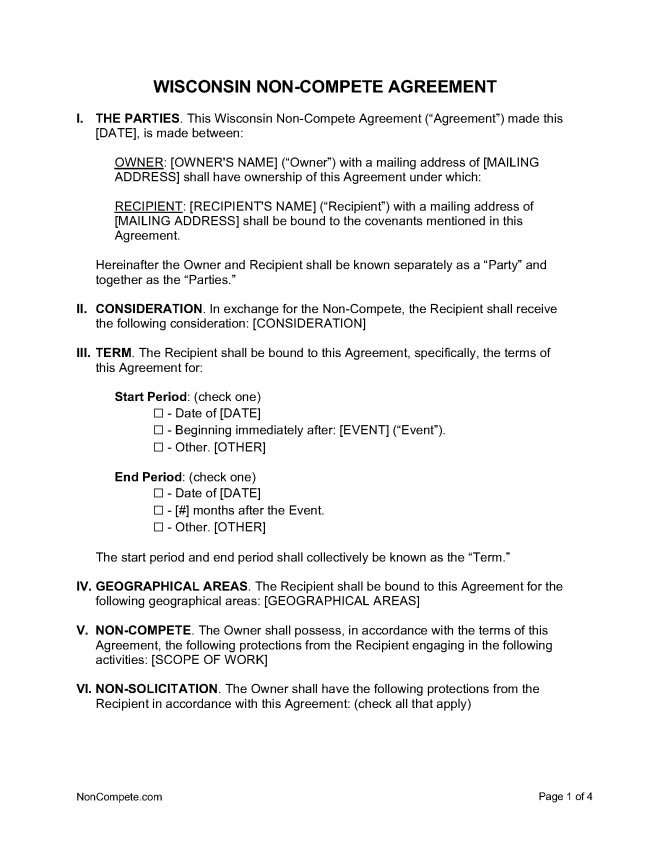A Wisconsin non-compete agreement is a contractual provision used to protect a business against unfair competition. When used to restrict the commercial activity of an employee, non-competes are scrutinized by the courts and stricter standards of review are applied. In connection with the sale of a business, non-competes are enforced more liberally.
Table of Contents |
Are Non-Competes Enforceable in Wisconsin?
Yes, a non-compete agreement is enforceable if it is:
- Necessary to protect the employer against unfair competition
- Reasonable in the scope of territory and time limit included
- Not unduly burdensome or oppressive on the restricted party
- Not against public policy interests
Non-compete agreements must be limited to a specific geographic territory and time frame, except when the provisions only seek to protect customers. (Chuck Wagon Catering Inc. v. Raduege (1979))
Reasonableness
The terms of a non-compete agreement must be reasonable, balancing the interests of both parties. Reasonableness is evaluated on several factors, including the interests protected, the liberty of the restrained party, and the public policy interest in free commercial exchange. (Reiman Associates, Inc. v. R/A Advertising, Inc. (1981))
Protectable Interests
Legitimate interests that can properly be protected with a non-compete agreement include:
- Customer contacts (Selmer Co. v. Rinn (2010))
- Goodwill (Chuck Wagon Catering Inc. v. Raduege (1979))
- Trade secrets and confidential business information (Wisconsin Trade Secrets Act 134.90)
Attorneys (prohibited)
Restrictive covenants cannot restrain competitive activity by attorneys, who under Wisconsin’s Rules of Professional Conduct (5.6) possess a right to practice law. However, non-compete agreements connected with the sale of a law firm or regarding retirement packages may be valid.
Terminating an Employee
Non-compete agreements can survive the termination of an employment relationship, but if the employee who was fired relied on a promise of continued employment in signing the agreement, or if the employer breached the employment agreement, the covenant may be voided and unenforceable. (Runzheimer Intern., Ltd. v. Friedlen (2015))
Burden of Proof
The party seeking to enforce a non-compete agreement bears the burden of proving its reasonableness and necessity. (W.S.A. 103.465) But if the restricted party proactively seeks to avoid a non-compete contract on the grounds of lack of consideration, the burden of proof falls to them. (NBZ, Inc. v. Pilarsk (1994))
Continued Employment (consideration)
As with all contracts, consideration is required to support a non-compete agreement. While an initial offer of employment is considered sufficient consideration, the question of whether continued employment suffices is an open question under Wisconsin law. The court in NBZ, Inc. v. Pilarsk (1994) indicated that additional consideration may be required, but in Runzheimer Intern., Ltd. v. Friedlen (2015), a promise of continued employment was adequate.
Maximum Term
A non-compete agreement must include reasonable term limits. While there is no set maximum on term limits, agreements lasting one to two years are commonly upheld.
Partial Enforcement
Restrictive covenants in the context of employment are entirely void if overbroad and will not be modified or partially enforced by the courts. (W.S.A. 103.465)
However, non-compete agreements in connection with the sale of a business may be modified and enforced to the extent that they are necessary and reasonable. (Reiman Associates, Inc. v. R/A Advertising, Inc. (1981))
